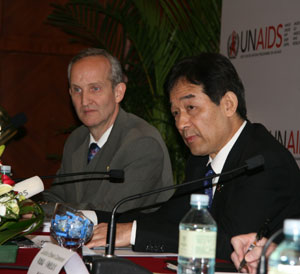By Wang Zhiyong
Stigma and social prejudice attached to HIV infection and AIDS are the chief obstacles to effectively fighting the disease. That was the message delivered to journalists yesterday by South African Supreme Court Justice Edwin Cameron and former Chinese Vice-Minister of Health, Professor Wang Longde.
|

|
| Visiting South African Supreme Court Judge Edwin Cameron calls for an end to discrimination against people living with HIV and AIDS at a press conference held by UNAIDS in Beijing on October 30, 2008. Photo by Wang Zhiyong [China.org.cn] |
Justice Cameron who is openly gay and has been living with AIDS since 1997, is in China at the invitation of the Minister of Health and UNAIDS. During his visit, he will meet with government representatives, academics, campaigners and business leaders, and people living with HIV.
"I commend China for the legal framework that exists to protect the rights of people living with HIV. However, I understand from my discussions here that much remains to be done to ensure the rights of people living with HIV are protected in practice. This would include rights to treatment," Justice Cameron said.
Justice Cameron said one of the reasons for the high level of prejudice in China is that most of those infected are from social groups that are already heavily stigmatized – men who have sex with men, intravenous drug users, and sex workers. He said laws that criminalize these groups are entirely counterproductive.
Cameron emphasized that with modern drug treatment, AIDS has become a fully medically manageable disease. He said that his life expectancy was the same as any other man of his age.
But a recent survey by China HIV/AIDS Media Partnership (CHAMP) carried out in six Chinese cities revealed a worrying lack of knowledge about HIV and AIDS and a disturbing willingness to discriminate against people living with HIV:
- 30% think HIV-positive children should be excluded from mainstream schools.
- 65% would not share a house, and 48% would not share a meal, with an HIV-positive person.
|

|
| Professor Wang Longde (right) calls for health staff all over China take the lead in countering discrimination against people living with HIV at a press conference presided by Dr. Bernhard Schwartlander (left), UNAIDS Country Coordinator, in Beijing on October 30, 2008. Photo by Wang Zhiyong [China.org.cn] |
Professor Wang Longde said "Significant progress has been made in responding to AIDS in China, but much remains to be done. Unfortunately even in the health sector we are struggling with discrimination against people living with HIV. Health staff all over China must take the lead in countering discrimination. How else can we convince others that there is nothing to fear?"
Although discrimination against HIV positive people is prohibited by law in China, almost universal social prejudice is having a very harmful effect on HIV prevention. It creates a fear of being associated with AIDS that stops people seeking information about HIV or getting tested. UNAIDS estimates that over 700,000 people are living with HIV in China, but most are unaware they have been infected, which means they do not get the counseling and treatment that could help save their own lives and those of their sexual partners.
In China most people living with HIV qualify for free treatment with first line Antiretroviral (ARV) drugs. However, some people have developed resistance to these drugs and require second line drugs which are not widely available. Another problem according to Justice Cameron is that while ARV treatment is free, patients often have to pay for antibiotics to treat secondary infections, and this can cause significant hardship.
UNAIDS says that that in 2007, there were approximately 50,000 new infections, and 20,000 AIDS related deaths. Sexual transmission is now the most common route for HIV infection in China. Up to 150,000 people living with HIV may require ARV treatment according to the Government's guidelines but currently only about 40,000 are receiving treatment.
Link: AIDS-Related Knowledge, Attitudes, Behavior, and Practices: A Survey of 6 Chinese Cities | Download | Download the Chinese version
(China.org.cn October 31, 2008)